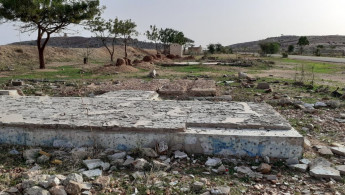Sudan: West Darfur violence reaches capital El-Geneina, residents report
Armed fighting broke out on Monday in El-Geneina, capital of West Darfur and Sudan's westernmost city, residents said, as violence that killed scores of people in a nearby town over the weekend spread.
Unrest across Darfur, where a war between rebels and government forces backed by militias claimed an estimated 300,000 lives in the early 2000s and displaced millions, has been on the increase in the past two years.
The fighting over the weekend was among the most deadly in the region over that period. Last year alone some 430,000 people were displaced.
"Since sundown we've been hearing gunshots. I can hear them right now," a resident of El-Geneina said on Monday.
"Everyone is hiding inside their homes, because the fighting is in the street and no one can leave," he added, speaking by telephone. He declined to be named out of fear for his safety.
The latest fighting began with an altercation on Thursday between members of different tribes, according to rights groups active in the area.
It escalated on Friday with an attack on the town of Kreinik, near El-Geneina, by "Janjaweed" militias that killed at least nine people, according to the Coordinating Committee for Refugees and Displaced People.
Hospital attacked
The situation in the area remained tense before another attack on Kreinik, home to tens of thousands of displaced people, on Sunday, when at least 168 people were killed and 98 wounded, according to the committee.
At least 20,000 people were displaced as their homes were burned down, said the Darfur Bar Association on Sunday.
The fighting began to spread towards El-Geneina, where the city's main hospital was attacked and four people were killed, according to doctors' unions.
Residents said the fighting on Monday appeared to be between members of Janjaweed militias and rebel groups, mirroring the conflict in the early 2000s. They did not see any sign of intervention by the army.
The Darfur conflict pitted troops and mostly Arab militias against mostly non-Arab rebels who accused the government of discrimination and neglecting the region.
Medics from the Central Committee of Sudan Doctors warned of 'catastrophic' health conditions in West Darfur, saying that several hospitals were attacked in the violence 👇https://t.co/WOrzzL9F0j
— The New Arab (@The_NewArab) April 25, 2022
Over time fighting descended into banditry and skirmishes. But successive peace efforts and deals did nothing to heal deep, ethnically charged enmity and resentment.
Janjaweed is a name given to the militias who rights groups blame for some of the worst atrocities in Darfur. A man accused of being a Janjaweed leader went on trial at the International Criminal Court earlier this month on war crimes charges.
While some rebel groups joined the government in a 2020 peace deal, some of the Janjaweed was absorbed into the paramilitary Rapid Support Forces that are also part of the government.
Analysts and activists said some of the groups on both sides that were not included in the peace deal may have become more aggressive in response.
A joint peacekeeping force called for by the agreement has yet to fully materialise across the region.
(Reuters)





 Follow the Middle East's top stories in English at The New Arab on Google News
Follow the Middle East's top stories in English at The New Arab on Google News


